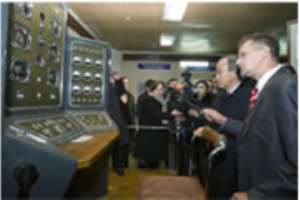
Warning that voluntary moratoriums on nuclear weapon tests are not enough, Secretary-General Ban Ki-moon today called on all Member States that have not yet done so to urgently ratify the United Nations-backed treaty banning them.
“Over the course of the Cold War, hundreds of nuclear weapon tests left behind a devastating legacy for local citizens and their natural environment,” he said in a message marking the International Day against Nuclear Tests. “Current voluntary moratoriums on nuclear weapon tests are valuable, yet they are no substitute for a global ban.”
General Assembly President Joseph Deiss also called on the hold-out States to ratify the treaty, citing the “dreadful dangers” for both humans and the environment from past tests.
“The fallout of nuclear tests caused diseases, poisoned the food chain and contaminated the water and its ecosystems; these effects are still felt today,” he said in a message.
Out of a total listed number of 195 States, 182 have so far signed the Comprehensive Nuclear-Test-Ban Treaty and 154 have ratified it. For the treaty to enter into force ratification is required from the so-called Annex 2 States. Of these China, the Democratic People's Republic of Korea (DPRK), Egypt, India, Indonesia, Iran, Israel, Pakistan, and the United States have yet to ratify it.
“We urgently need new progress in achieving a world free of both nuclear tests and nuclear weapons,” Mr. Ban said, citing the “the vital importance” of the treaty's entry into force and noting that its verification regime has proved to be a valuable instrument for international cooperation.
“I am fully confident of its future ability to provide an independent, reliable and cost-effective means of verifying, and therefore deterring, any violation of the treaty's provisions. For these reasons, I urge all States that have not yet signed or ratified the treaty to do so as a matter of priority,” he added calling such a move “a bold step towards a safer and saner world for all.”
The General Assembly proclaimed the Day in December 2009 and it was first celebrated last year. Various activities are planned throughout the world today, such as symposia, conferences, exhibits, competitions, publications, media broadcasts and others.
Noting that the Day also marks the 20th anniversary of the closure of the Semipalatinsk nuclear test site in Kazakhstan, Mr. Ban recalled visiting “the scene of this dark chapter in human history,” and stressed his support for the Kazakh Government and people as they continue to cope with the aftermath.
“I commend efforts to ensure that something positive may result from highlighting the horrific effects of these tests,” he said.
Tibor Tóth, Executive Secretary of the Preparatory Commission for the Comprehensive Nuclear Test Ban Treaty Organization, also stressed the importance of the closure of the Semipalatinsk site, noting that it was the scene of nearly a quarter of all nuclear weapon tests.
“It was an early example and it was a message – the message that the discontinuation of nuclear weapons tests is possible, discontinuation of a test site is possible or, going even further, discontinuation of nuclear weapons arsenals is possible,” he told UN Radio.
“Four to five hundred nuclear weapons tests took place during the last 50 years. During the last 10 years there were two.
Two too many, I would say. But we are closing the door on nuclear weapons tests. We are creating a no-test law and order, and we are implementing that law and order.”
Those tests were carried out by the DPRK in 2006 and 2009, after which the Security Council imposed sanctions, including an arms embargo, inspections of cargo suspected of containing banned items related to the country's nuclear and ballistic missile activities, and financial restrictions.




 NDC demands complete overhaul of security protocols at EC to safeguard electoral...
NDC demands complete overhaul of security protocols at EC to safeguard electoral...
 Ghana reaches interim deal with international bondholders — Finance Ministry
Ghana reaches interim deal with international bondholders — Finance Ministry
 Mahama to form joint army-police anti-robbery squads to safeguard 24-hour econom...
Mahama to form joint army-police anti-robbery squads to safeguard 24-hour econom...
 Another man jailed eight months over shrinking penis
Another man jailed eight months over shrinking penis
 Ghana to adjust external bond deal to meet IMF debt sustainability goals — Finan...
Ghana to adjust external bond deal to meet IMF debt sustainability goals — Finan...
 IMF negotiations: We've not failed to reach an agreement with bondholders; we’ve...
IMF negotiations: We've not failed to reach an agreement with bondholders; we’ve...
 EC begins recruitment of temporary electoral officials, closes on April 29
EC begins recruitment of temporary electoral officials, closes on April 29
 NPP lost the 2024 elections in 2022 due to inflation and cedi depreciation — Mar...
NPP lost the 2024 elections in 2022 due to inflation and cedi depreciation — Mar...
 Your good heart towards Ghana has changed; don’t behave like Saul - Owusu Bempah...
Your good heart towards Ghana has changed; don’t behave like Saul - Owusu Bempah...
 Wa West: NDC organizes symposium for Vieri Ward Women
Wa West: NDC organizes symposium for Vieri Ward Women
